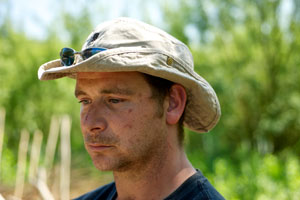
Wayne Franks took part in one of the Ecominds projects.
A new report by mental health charity Mind, including new findings from the University, shows the many benefits of ecotherapy for mental wellbeing.
The report Feel Better Outside, Feel Better Inside shows how ecotherapy been proven to improve mental health, boost self-esteem, help people with mental health problems return to work, improve physical health and reduce social isolation.
Over the last five years Mind funded 130 Ecominds projects with support from the Big Lottery Fund. These projects have introduced more than 12,000 people with and at risk of developing mental health problems to ecotherapy initiatives such as gardening, food growing or environmental conservation work. Ecotherapy helps people to look after their mental health by getting active outdoors while being supported by trained professionals.
Key findings reveal that:
• Mind’s Ecominds scheme helped 254 people find full-time employment with potential annual savings and contributions to the State of £1.46 million.
• Introducing just five people with mental health problems to ecotherapy saved the State more than £35,000 each year in costs for medication, Jobseeker’s Allowance, and healthcare.
• Seven in ten (69 per cent) people experienced significant increases in wellbeing by the time they left the Ecominds project.
• Three in five (57 per cent) felt that there were more people in their lives who cared about them and they met more often with friends and relatives.
• Four in five (81 per cent) got more involved in community activities and felt connected to where they live.
• Men are less likely than women to seek help for mental health problems and ecotherapy is a great way to engage them in wellbeing services - men formed three in five (56 per cent) of Ecominds participants .
Mind found from a survey of GPs working across England and Wales that even though over half agreed that ecotherapy is a valid and suitable treatment for anxiety (52 per cent) and depression (51 per cent), nearly three in five (56 per cent) said they need to see more evidence of the benefits of ecotherapy to refer confidently .
Paul Farmer, Chief Executive of Mind, said: “Our research shows people commissioning mental health services and social care that a holistic treatment like ecotherapy delivers not only health benefits, but wider social benefits and cost savings that medication could not. Ecotherapy improves mental wellbeing, it helps people to become more physically active, it gives people the skills to get back into work or training, and it helps people who are lonely or socially isolated to broaden their networks. These are all important factors that can prevent people developing a mental health problem to start with.
“Last year a staggering fifty million antidepressant prescriptions were issued and currently one in five people with mental health problems have to wait up to a year to access talking treatments. When growing numbers of people are affected by mental health problems each year and they’re telling us that they want more options than drugs, now is the time for commissioners across health, social care and public health to take a fresh look at this evidence and realise the long-term benefits that holistic treatments like ecotherapy can deliver.”
Rachel Bragg, Senior Researcher of the Green Exercise Research Team at the University of Essex said: “We found significant improvements in participant mental wellbeing, social inclusion and connection to nature after involvement in Ecominds.
It represents a fantastic way to achieve multiple health wellbeing and social benefits from one intervention, and because they are outside in nature and enjoying themselves it doesn't feel like a clinical intervention.
“There is also less stigma as there is less emphasis on what is wrong with you and more about what you can do.”
Wayne Franks joined the Idle Valley Ecominds project in November 2010 following a three-month hospital admission. Wayne is an ex-serviceman and has had post-traumatic stress and depression since coming out of the army in 1999.
He said: “I got no support from anyone when I was discharged. All I got told was ‘here are your papers, see you later.’ I had a breakdown and found myself on a mental health ward. I lost my house because I couldn’t pay the rent, and I lost my job due to injury. I had nothing.”
Wayne found out about the Idle Valley group through his Community Psychiatric Nurse (CPN). After attending the project for just 18 months he has considerably reduced his antidepressant medication and has been discharged by his CPN.
He said: “I didn’t even know there was a nature reserve near where I lived and I didn’t think that nature could help me in my situation. I tried it though, and now, looking back, if I hadn’t joined the project, I definitely wouldn’t be here.”
Mind’s Feel Better Outside, Feel Better Inside report is available to read online.
ENDS
Notes to editor:
For more information or interviews please contact Alice White at Mind on 0208 215 2227 or e-mail: a.white@mind.org.uk. An ISDN line is available on: 0208 221 0817.